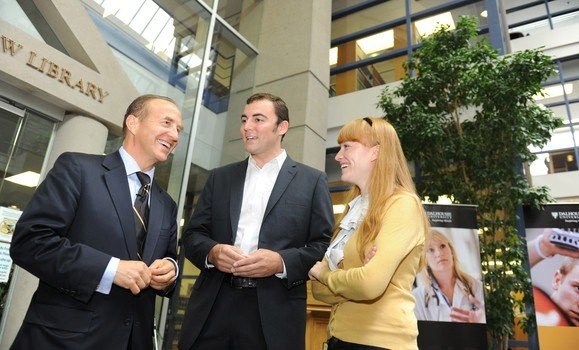John McCall MacBain is known as the “King of Classifieds”. He is celebrated for having built a worldwide empire of buy-and-sell magazines like Auto Trader, Buy and Sell, Bargain Finder, and home TRADER.
But for Dalhousie University, he’s known as the cheerful, down-to-earth philanthropist who has generously donated $3 million to found the MacBain Chair in Health Law and Policy – a chair that will be put Dal on the frontier of health law and policy research in Canada. This is the latest gift as a result of Dalhousie's Bold Ambitions campaign.
On Friday, Dr. McCall MacBain announced his contribution to members of the Dal community including Dalhousie President Tom Traves, Dean of Law Kim Brooks, and Director of Health Law Institute Constance MacIntosh.
“The MacBain Chair comes at a time when challenges to our health systems abound and demand for expertise in health law and policy is high,” said Prof. MacIntosh at the announcement in the atrium of the Weldon Law Building, who noted that the Chair will bring not only a stellar new colleague but energy, enthusiasm, and potential for the work of the institute.
“As we vigorously seek to have the health and well-being of all Canadians enhanced, and health laws and policies developed which service the greatest public good, the MacBain Chair in Health Law and Policy demonstrates a concentrated commitment to these critical issues, and a means to improving the welfare of humanity in the process,” she continued. “And we are truly grateful.”
Putting Health Law Institute on the map
Health law and policy has become an increasingly important area of research with legal and ethical impacts that span across many disciplines. It involves difficult and highly controversial topics like: end of life treatment, policy, and practice; patient safety; privacy and confidentiality of health information; neuroethics; and public health emergencies.
The MacBain Chair will have a combination of teaching and research responsibilities that will attract students and scholars to the university, making Dal the largest active health law and policy faculty in Canada. In fact, Dalhousie's Schulich School of Law is the first in the country to offer health law as a specialization at the undergraduate (JD) level.
The responsibilities of the Chair will span outside the law school in various faculties including the Faculty of Dentistry, the Faculty of Medicine, and the Faculty of Health Professions, giving students a diverse learning experience unlike any other school in Canada.
‘Good sense of purpose'
The $3 million donation will benefit the lives of many Canadians. But for Dr. McCall MacBain, whose father graduated from the Dalhousie Law School in 1951, the generous donation is all in a day’s work.
When he sold his classified ad business in 2007, he and his wife set up The McCall MacBain Foundation based in Geneva, Switzerland. The charitable foundation focuses on improving the lives of others through university and community grants in health, education, and the environment.
“It gives us a good sense of purpose,” he explains. “We live a good life but we don’t own a ton of artwork or have expensive boats. There are greater needs in the world and we wanted to give back as much as we could.”
Since its establishment, The McCall MacBain Foundation has been active in international development and efforts toward climate control.
“Philanthropy can be a hard business sometimes because you don’t always know where your money is going,” explains Dr. McCall MacBain. “But universities like Dalhousie are always good and strategic about spending it in the right places.”
“There’s a direct correlation between good education and good health care,” he says. “We need great universities in Canada. In the end, it’s our future.”

